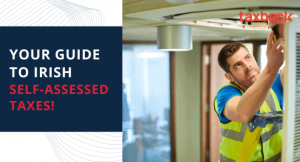Every Single Thing You Need to Know About Australian Tax and PSI
Are you wondering what the hell Personal Services Income is and how it might affect you?
If the answer is yes, then we can assure you, you’ve come to the right place.
This is the ultimate guide to every single thing you need to know about PSI.
First and foremost, Personal Services Income or ‘PSI’ is a super boring (but super important) tax term that refers to income generated through work related to personal skills or efforts from an individual (that’s you!).
Yep, it’s boring but you’ll need to understand PSI and the implications of earning PSI because it affects the amount of tax you pay!
PSI is not specific to any particular industry, profession or trade. You could be a hairstylist, a landscaper or a financial professional earning PSI. PSI also applies to companies, partnerships and trusts but it does not apply if you’re an employee who only receives a salary or wage.
What exactly is PSI and how can it affect me?
If you’re selling your specific skill set, knowledge and your time as opposed to a physical product, then you’re earning PSI. However, depending on your circumstances, you could be entitled to certain tax reliefs… and who doesn’t want to reduce their tax bill? I mean, come on!
There are a bunch of pesky rules called the ‘PSI rules’ that affect the amount of tax you pay. If these rules don’t apply to you, then you may be able to access more deductions and reduce your tax bill.
Attributed and Non-attributed PSI – What’s the difference?
Attributed PSI is when payments were made to a taxpayer as an employee, therefore in the case that an individual has their own ABN, attributed income is not paid to the entity that is the taxpayer with his own ABN but as general employment. The individual will receive a PAYG with the income and relevant tax reported to the ATO by the payer.
In the case that your PSI is paid to a PSI entity, the income (less certain deductions that relate to producing and gaining that income) is attributed to you unless;
- The personal services entity gained the income in the course of conducting a personal services business.
OR
- The income was promptly pair to you by the entity as a salary.
Attributing PSI
The PSI your business receives needs to be allocated aka attributed to each individual who performed the services (after being reduced by certain deductions), and the individual then declares the income in their individual tax return.
Non-attributed Income is the PSI paid to the taxpayer as an entity (sole trader). This kind of income must be reported as ABN income on the income tax return under the ABN. This taxpayer won’t receive PAYG for the income from the payer. Also, nothing will be reported to the ATO on a general basis. That being said, there are other ways that the ATO receive such information for ABN income paid to individual sole traders).

Do the PSI rules affect me?
If you’re a contractor, a consultant or a full time poodle groomer and you’re earning PSI, there are some special tax rules that may affect the amount you include in your assessable income and what kind of tax deductions you can claim. Having your income labelled as PSI reduces the deductions you can claim.
There is certain criteria that you must meet in order to be eligible for these reliefs and deductions.
First of all, Income you earn is classified as PSI if more than 50% of the amount you received for a contract was for your specific skills, expertise and/or labour… but how do you know if your income is definitely classified as PSI?
It’s a bit confusing, don’t worry, there are some steps you can take to work it out that we’ll get into in just a minute.
Let’s take Anne from next door, she’s a landscaper. Anne uses her unique skills and effort in each contract she takes on. She isn’t selling a product or operating particular equipment to earn her income, instead, she is applying a specific skill set. Her income is PSI but she needs to apply a few different tests to find out is PSI rules affect her and her assessable income.
Confused About Your Oz Taxes? We Can Help!
What happens if the PSI rules apply to me?
When the PSI rules apply to the PSI you received, they will affect how you report that PSI and the deductions you can claim. If you’ve received PSI and the rules do apply to you, you must complete certain questions in your tax return and the deductions you can claim will likely be affected.
If the psi rules apply if your business income is PSI then income earned will be taxable in the hands of the person who generated the income regardless of what entity is used.
Is my business a PSB?
When a business receives more than 50% of its income from a contract and supply of labour that depends on the skills or expertise of the contractor performing the work then all of the income under that contract is classed as PSI.
If the PSI rules don’t apply to your business, then your business may be classed as a Personal Services Business or PSB. In this case, there aren’t any changes to your tax obligations except you don’t have to declare PSI when filing your tax return.
The very first step for assessing if a business is a PSB, is that the business earns PSI. A business is not classed as a PSB where it can show it passes the results test. If a business fails this test, they can try the following tests.
If a business is not a PSB, the PSI rules will apply.
The PSI rules don’t apply if the contractor qualifies as a PSB. Lots of professionals rely heavily on the PSB exclusion to avoid the PSI rules by the Results Test, the 80/20 Test or the Unrelated Clients Test.
You must keep a record of all contracts in terms of income. You will then examine each one and determine if you received PSI for the job. If so, you’ll need to work out if the PSI rules apply to that income.

What are the steps set out by the ATO to determine if I have received PSI and if I’m running a PSB?
Step 1 is to work out if you received PSI, steps 2-4 are the PSB tests, and they will help you determine if you’re running a PSB. These steps must be taken in the right sequence.
If more than one person in your company, trust or partnership is generating PSI, you’ll have to go through the steps separately for each individual.
Step #1: Have I received PSI?
If more than 50% of the income you’ve received for a contract is for skills, labour or expertise, you have received PSI.
If you answered yes to Step #1, you must now work through the following tests.
Step #2: The Results Test
If you can answer yes to each of the following questions in relation to at least 75% of your personal services income, you may be eligible and be free from having your income caught under PSI.
Q1: Under your contract or your arrangement with your client or customer, do you only receive payment on completion of your work or after you have produced the contracted result? E.g. Anne is only paid for renovating John’s garden after the job has been completed to a satisfactory standard.
Q2: Is it your responsibility to provide the equipment or tools necessary to complete your work.
Q3: Are you liable for the costs of any defects and is it your responsibility to rectify mistakes or defects?
The results test identifies whether the engagement of your services and the payment due is dependent on a specific result being achieved.
So, Anne scores a sweet contract for a job, there is a fixed price of $2,000 for a fixed outcome agreed upon by Anne and her customer. Anne will not be paid until after the job has been completed to the customer and Anne’s agreed specifications. She pays for and uses her own equipment and if Anne makes a mistake of some kind, she will be liable to pay to fix this mistake.
If you satisfied the criteria for Step #2 then the PSI rules don’t apply. If you failed to answer yes to these three questions, you can continue to Step #3.
Step #3: The 80% Rule
If 80% or more of your PSI comes from the same client, or a client and one of their associates, the PSI rules will apply to you and you have failed this test. If you’re unsure about this, contact Taxback.com today, and we can help you figure it out!
If you find each of your clients provide less than 80% of your PSI, then continue to Step #4
Step #4: The Remaining Tests
The final tests are; Unrelated Clients Test, the Business Premises Test and the Employment Test if you pass any of these tests, the PSI rules don’t apply to the PSI being tested.
1. The Unrelated Clients Test
This test is satisfied if your business provides services to two or more clients who are not associated with each other.
So, if Sally provides an accountancy service to two clients who are not related to each other, she will pass the test. Not be controlled by same individuals, businesses or entities. Must offer services to broader public, advertising, website, word of mouth etc.
If you fail this test, move on to…
2. The Employment Test
If your employees or other partners complete 20% (by the market value) of the work you’re being paid for, you’ll pass this test. Having an apprentice for 6 months a year will be enough.
If you fail this test move on to...
3. The Business Premises Test
You’ll pass this test so long as your business premises is used solely for the operation of your business and is not in any way connected to your home at all times of the year. The premises also can’t be shared with another business.
You can pass more than one test but you only need to pass one to pass the PSI income tests. If you fail to meet this criteria, you will not be eligible to claim any reductions.
If your business is classed as a PSB, it can’t claim a tax deduction for the following:
- Rent, mortgage interest rates, or land tax related to the business owner’s home.
- Payments to a spouse or associate the support work such as secretarial and bookkeeping duties.
- Expenses that could not generally be deducted by an employee.
Also, the PSI earned by the business must be allocated to each individual who performs the services, after being reduced by allowable deductions. Any payments made to working employees of the business must have tax deducted as if they are an employee, and any profit must be declared by the individual earning the PSI.

How do the PSI rules affect a sole trader?
If you’re a sole trader, you can’t claim certain deductions against your PSI and you will need to meet certain tax return obligations when the PSI rules apply.
Deductions: The rules that limit the deductions you’re allowed to claim only apply to income that’s PSI, not any other income you earn. You can still claim deductions for expenses for earning other income according to the normal tax rules.
Confused About Your Oz Taxes? We Can Help!
How do the PSI rules affect a company, partnership or trust?
If you operate through a company, partnership or trust and the PSI rules apply, you’ll have to be aware of the following:
Deductions
Firstly, the PSI rules that affect the deductions you can claim only apply to income that is PSI. If you earn any other income, you can still claim deductions for expenses in earning other income according to normal tax rules.
If you received both PSI and other income, you have to allocate your expenses between each category of income. Where the PSI has been generated by more than one individual, the deductions relating to that PSI must be allocated to the individuals who worked for it.
If the rules do apply, you can’t claim the following deductions against that income:
- Rent, mortgage interest, rates or land tax for your home (or your associate's home)
- Payments to your spouse, or other associate, for support work such as secretarial duties
- Expenses that you would generally not be able to deduct as an employee.
If you want to find out more about your tax PSI tax entitlements or you’d like someone to take care of all the boring paperwork for you, then we’re here to help. You can get more information on your Aussie tax return via email, free-phone or our 24/7 Live Chat service.
If you're wondering how to calculate your tax return - simply use our FREE calculator to find out how much tax back you are owed!
Confused About Your Oz Taxes? We Can Help!
Every day, our team of qualified tax experts help people file taxes and claim tax back in 13 countries worldwide!




